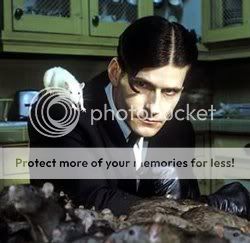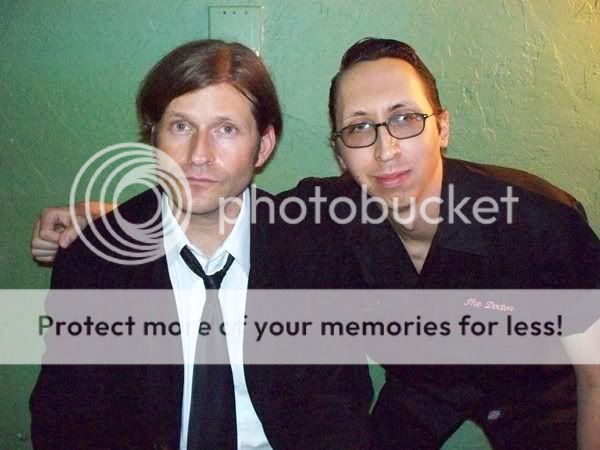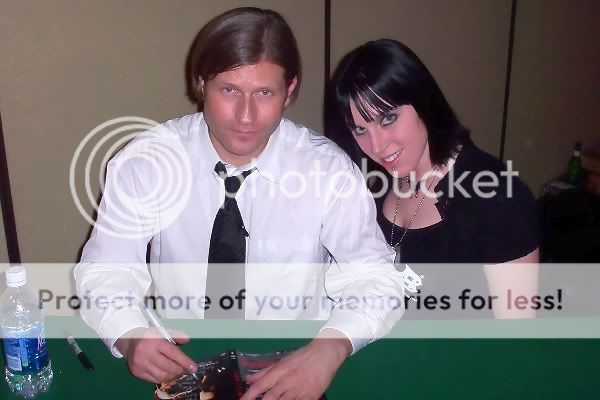As a child, Glover attended The Mirman School for the academically gifted.

Acting
His breakout role was as George McFly in Robert Zemeckis's Back to the Future, an international box office success following its release in 1985. Glover did not, however, come to an agreement with the producers to appear in the sequels. Zemeckis used previously filmed footage of Glover from the first movie, and Jeffrey Weissman was introduced using various obfuscating methods (background, sunglasses, rear shot, even upside down) to play the role of George McFly in the sequel. Displeased with the apparent use of body prosthetics on another actor to make audiences believe he was in the movie, Glover then sued the producers (including Steven Spielberg) on the grounds that his contract for the first film did not allow subsequent use of his portrayal of George McFly in new films, and that the use of a false nose and cheekbones on Weissman combined with practiced impressions of Glover's realization of the George McFly character were evidence of such. Because of Glover's lawsuit The Screen Actors Guild (TV/Film performer labor union) would later alter collective bargaining agreements with clauses to the effect that such use would be open to negotiation, with acceptance at the performers' discretion. According to Glover, even some of his close friends (including fellow actor Nicolas Cage) thought that he was in the sequel, also.[4]
He has continued to play exceedingly eccentric types, e.g. playing Andy Warhol in Oliver Stone's The Doors in 1991, as well as the title characters in Bartleby (2001) and Willard (2003). He received mainstream attention as the "Creepy Thin Man" in the Charlie's Angels films;[5] the character had initially been cast as a speaking role, but Glover, not liking the lines as written, convinced the producers to eliminate the lines to create a darker image for the character.

Late Night appearance
Glover is often remembered for his appearance on Late Night with David Letterman[8] on July 28, 1987, to promote his movie River's Edge.[9] Unbeknownst to Letterman and the audience, who didn't recognize the character from the as yet unreleased film, Rubin and Ed, Glover appeared in character as the titular Rubin, wearing his costume from the film (platform shoes and a wig) and staged an Andy Kaufman-like shtick. After being goaded by a woman in the audience (who some argue was a plant[10]), Glover became incensed and stated that he "knew that this was gonna happen [sic]" and that "the press, they can do things, they can twist things around". After a failed attempt to challenge Letterman to an arm-wrestling match, Glover delivered an impromptu karate kick just inches from Letterman's face while shouting, "I'm strong... I can kick!".[11] Letterman then abruptly ended the segment by walking off stage, saying "I'm going to check on the Top 10", and the program cut to commercial. The studio audience and Letterman himself were apparently shocked by Glover's behavior and assumed he was being himself.
[youtube="lQC8ennE6gA"]Letterman[/youtube]
Music
In 1989, during a hiatus from films, Glover released an album called The Big Problem Does Not Equal the Solution, The Solution Equals Let It Be through Restless Records, produced by Barnes & Barnes (of "Fish Heads" fame). The album features original songs like "Clowny Clown Clown", warped covers of Lee Hazlewood's "These Boots Are Made for Walkin'" and Charles Manson's "I'll Never Say Never to Always" (sung in falsetto), and readings from his art books Rat Catching and Oak Mot (Glover modified old books with expired copyrights by adding or deleting pictures, text, and drawings). Sample pages from these books are featured in the album's liner notes.
The back cover of the album is a collage of figures relating to each track on the album, with a puzzle: "All words and lyrics point to THE BIG PROBLEM. The solution lay within the title; LET IT BE. Crispin Hellion Glover wants to know what you think these nine things all have in common." He included his home phone number with copies of the album, encouraging listeners to phone when they had "solved" his puzzle. Glover later commented that he was surprised how many people figured it out.
In 2003, he recorded a cover version of the Michael Jackson song "Ben" to coincide with the release of the film Willard. In the eccentric music video for the song, which is included on the Willard DVD, he sings to a rat named Ben.
Books
Crispin has written between 15-20 books,[12] many of which are featured during his Big Slide Show presentation. Thus far, only four of his books have been published through his publishing company, Volcanic Eruptions. Other known titles include: The Backward Swing and Round My House.
Personal Quotes
[On contemporary movies] People watch movies - and it's vague ideas, it's vague notions, but people pick up on these things, that they are supposed to think certain ways or that they're not supposed to think, basically, and they don't. And then it's like, if you do any thing that's thoughtful, they think, "Oh, that's weird..." (Ain't It Cool News, 2003.)
Realism is always subjective in film. There's no such thing as cinema verite. The only true cinema verite would be what Andy Warhol did with his film about the Empire State Building - eight hours or so from one angle, and even then it's not really cinema verite, because you aren't actually there. As soon as anybody puts anything on film, it automatically has a point of view, and it's somebody else's point of view, and it's impossible for it to be yours. (NYPress, 2002.)
The United States has it's own propaganda, but it's very effective because people don't realize that it's propaganda. And it's subtle, but it's actually a much stronger propaganda machine than the Nazis had but it's funded in a different way. With the Nazis it was funded by the government, but in the United States, it's funded by corporations and corporations they only want things to happen that will make people want to buy stuff. So whatever that is, then that is considered okay and good, but that doesn't necessarily mean it really serves people's thinking - it can stupify and make not very good things happen.
[On absence of countercultural film] There's a healthiness to having something that people some people are taken aback by a little back, because what that means is that there's a discussion going on. And when there's nothing that's being taken aback, nobody's surprised, nobody's being tested or challenged, then there's no learning process going on, and it makes for a stupefied culture and I think that's happening.
In the past, I've never tried to discount or stop what people are saying because on some levels I find it interesting. But if I look on the Internet or in news chat groups, I tend to read, 'Oh, that guy's crazy, that guy's nuts. He's insane or psychotic.' At a certain point, it does get a bit like, 'I'm not. Really.' Look, I one-hundred percent admit and in fact implore people to understand that, yes, I am very interested in countercultural things. But there's a difference between having artistic interests and being psychotic. That's more than a fine line of differentiation, and I do see that a bit too much.
[On being called eccentric] Eccentric doesn't bother me. "Eccentric" being a poetic interpretation of a mathematical term meaning something that doesn't follow the lines - that's okay.
I think what eccentricity can represent in terms of the fear it engenders is a challenge to what is already considered right or good by people who have invested a certain amount into their life and livelihood that is not eccentric, but centric. If there's a challenge to that, that can make people concerned that either what is considered a safe way of living or a good way of living may be pulled out from under them. I can understand that. That's why countercultural film movements are important since it's lacking in the culture right now. There's an idea that there's value to an alternate point of view, but everything that's presented in the media is procultural, and it makes people nervous when there hasn't been a true discussion of alternate points of view. There's no general discussion in the media.
I do like things that are not necessarily a reflection of what is considered the right thing by this culture. Somehow, promoting that status quo I find uninteresting. I have thought about that more as the years have gone on, and it's a feeling that I would not have been able to describe 15 years ago as I can now. But at the same time, I don't intellectualize it, I don't have a written manifesto or just say this is the only thing I can do or will do.
I'm not somebody who believes that darkness is something that should necessarily be hidden from children or anything like that. I think children like a lot of the same things that they like as adults' or rather, the other way around, adults like a lot of the same things that they liked when they were children.
Probably my four favorite directors are Werner Herzog, Rainer Werner Fassbinder, Stanley Kubrick and Luis Buñuel, because with all of their work you can think beyond the edges of the film. They're not films that dictate to you, this is what you must think. They're all films that have compelling stories, but there are thoughts beyond the films themselves.
At a certain point in an actor's career it is good to say to oneself "What am I?" and then figure something out. You could call this entity an archetype as opposed to a stereotype. I believe this conclusion of self is a good thing to stick with, and explore the entire universe from this point of view. This does not limit one, but expand. It is only good if one can get some kind of truth from within this point of view. If it is a false ideal, then it will become a "stereotype" as opposed to an archetype.
I think humor delineates who your friends really are. I worked on Little Noises (1992) with Rik Mayall, and he described to me a theory of humor. With pack animals, if there's a sick one in the bunch, the others will growl at it and try to get rid of it. This translates to the comedian on-stage. There are two types of comedians. One who says, "Everybody laugh at that person," and the braver comedian who makes them laugh or growl at himself. It brings people together. The audience laughs at this sick thing: they become a part of this clan or tribe. And that's where you get your friends: you share a certain humor about the sick and the foolish.
There's a tradition in the American media to ask actors what the movies are about, but it always seems wrong. It seems like the directors and the writers only often see an actor quoted in what a movie is about.
[On filmmaking] My favorite part is editing. That's where you are making the final art of what the movie is. Being on set is kind of the war element. Editing is a kind of, clean-up stage where the beauty comes into it.
[On strip clubs] The ecdysiast's art, the appreciation of the female form, the prurient music handpicked by the dancers contribute to an atmosphere I truly enjoy.
The Hero's Journey is the most basic story form. All stories and myths are, on some level, a Hero's Journey. It is almost impossible to relay any kind of story without utilizing some pattern from the structure of a Hero's Journey. One could simply say, "He went across the street". And this would be the hero leaving his normal world to set out upon his quest. It can come forth from the psyche in many different patterns, still work within a greater pattern, and still be good structure as long as it is reflective of an inner psychic truth.
Credit: Wikipedia and IMDB
Photos


Vids
[youtube="_ZJikZtwXUA"]Interview 1[/youtube]
[youtube="B9j7ISnwaPg"]Interview 2[/youtube]
xNTx
I want consume this man's brain for breakfast. On top of cheerios, even though I don't eat that kind of food.

